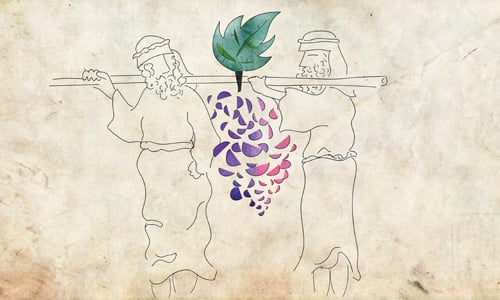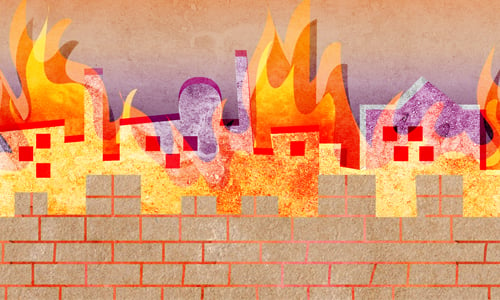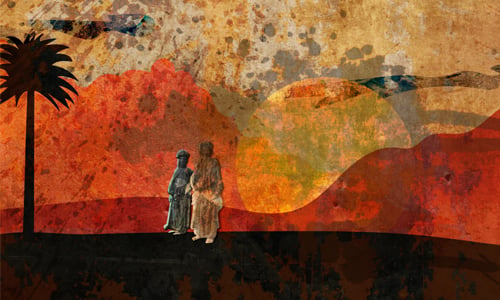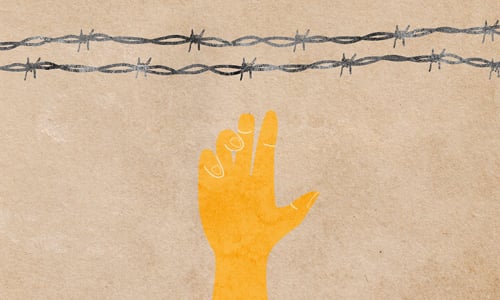
Tisha B’Av, the 9th day of the month of Av (July 26-27, 2023), is the saddest day on the Jewish calendar, on which we fast, deprive ourselves and pray. It is the culmination of the Three Weeks, a period of time during which we mark the destruction of the Holy Temple in Jerusalem.
What Happened on the Ninth of Av?
The 9th of Av, Tisha b’Av, commemorates a list of catastrophes so severe it’s clearly a day set aside by G?d for suffering. Learn seven historical events that took place on Tisha b’Av, the Jewish day of mourning.
1. The Spies Returned With a Bad Report

Picture this: The year is 1313 BCE. The Israelites are in the desert, recently having experienced the miraculous Exodus, and are now poised to enter the Promised Land. But first they dispatch a reconnaissance mission to assist in formulating a prudent battle strategy. The spies return on the eighth day of Av and report that the land is unconquerable. That night, the 9th of Av, the people cry. They insist that they’d rather go back to Egypt than be slaughtered by the Canaanites. G?d is highly displeased by this public demonstration of distrust in His power, and consequently that generation of Israelites never enters the Holy Land. Only their children have that privilege, after wandering in the desert for another 38 years.
2. Both Holy Temples Were Destroyed

The First Temple was also destroyed on the 9th of Av (423 BCE). Five centuries later (in 69 CE), as the Romans drew closer to the Second Temple, ready to torch it, the Jews were shocked to realize that their Second Temple was destroyed the same day as the first.
3. The Battle at Betar Was Lost

When the Jews rebelled against Roman rule, they believed that their leader, Simon bar Kochba, would fulfill their messianic longings. But their hopes were cruelly dashed in 133 CE as the Jewish rebels were brutally butchered in the final battle at Betar. The date of the massacre? Of course—the 9th of Av!
4. The Romans Plowed the Beit Hamikdash

One year after their conquest of Betar, the Romans plowed over the Temple Mount, our nation’s holiest site.
5. The Jews Were Expelled From England

The Jews were expelled from England in 1290 CE on, you guessed it, Tisha b’Av.
6. The Jews Were Banished From Spain

In 1492, the Golden Age of Spain came to a close when Queen Isabella and her husband Ferdinand ordered that the Jews be banished from the land. The edict of expulsion was signed on March 31, 1492, and the Jews were given exactly four months to put their affairs in order and leave the country. The Hebrew date on which no Jew was allowed any longer to remain in the land where he had enjoyed welcome and prosperity? Oh, by now you know it—the 9th of Av.
7. Both World Wars Began

The Jews were expelled from England in 1290 CE on, you guessed it, Tisha b’AvReady for just one more? World War II and the Holocaust, historians conclude, was actually the long drawn-out conclusion of World War I that began in 1914. And yes, amazingly enough, Germany declared war on Russia, effectively catapulting the First World War into motion, on the 9th of Av, Tisha b’Av.
What do you make of all this? Jews see this as another confirmation of the deeply held conviction that history isn’t haphazard; events – even terrible ones – are part of a Divine plan and have spiritual meaning. The message of time is that everything has a rational purpose, even though we don’t understand it.
The Laws of Mourning on Tisha B’Av
As part of our mourning for the destruction of the Temple and the exile of Israel, we abstain from many pleasurable activities on the night and day of Av 9—starting with sundown on the eve of the day before, and concluding with the following nightfall.
Specifically, we don’t:
- We abstain from many pleasurable activities on the night and day of Av 9
- Eat or drink. All adults – even pregnant and nursing women – fast on this day. One who is ill, or a pregnant woman who feels excessive weakness, should consult with a rabbi. An ill person who is not fasting should refrain from eating delicacies and should eat only that which is absolutely necessary for his physical wellbeing.
- Wear leather footwear, or footwear that contains any leather (even if it is only a leather sole).
- Sit on a normal-height chair until midday. (“Halachic” midday is the halfway point between sunrise and sunset; (click here for the exact times in your location.)
- Bathe or wash oneself—”even to insert a finger in cold water.”
Exceptions:
One who becomes soiled may rinse the affected area with cold water.
It is permitted to wash up after using the restroom.
When preparing food – for children, or for the post-fast meal – one may wash the food, even if it also, incidentally, washes the hands.
When ritually washing the hands in the morning, the water should be poured on the fingers only until the knuckle joints. - Apply ointment, lotions or creams.
It is permissible, however, to bathe a baby and apply ointments to his skin. - Engage in marital relations or any form of intimacy.
- Send gifts, or even greet another with the customary “hello” or “how are you doing?”
- Engage in outings, trips or similar pleasurable activities.
- Wear fine festive clothing.
- Engage in time-consuming labor on Tisha B’Av morning except in cases of great need.
After midday, work is permitted, but it is ideal not to work, as on this day, one’s focus should be on mourning and repentance. - “One who mourns Jerusalem will merit to see her happiness”Study Torah, because “the commandments of G?d are upright, causing the heart to rejoice” (Psalms 19:9). It is, however, permitted – and encouraged – to study sections of the Torah which discuss the laws of mourning, the destruction of the Temples, and the tragedies which befell the Jewish people throughout our history. This prohibition actually begins at midday of the day before Tisha b’Av.
“One who mourns Jerusalem will merit to see her happiness, as the verse (Isaiah 66:10) promises: ‘Rejoice with her greatly, all who mourn for her'”—Talmud Taanit 30b.
Source: Chabad.org